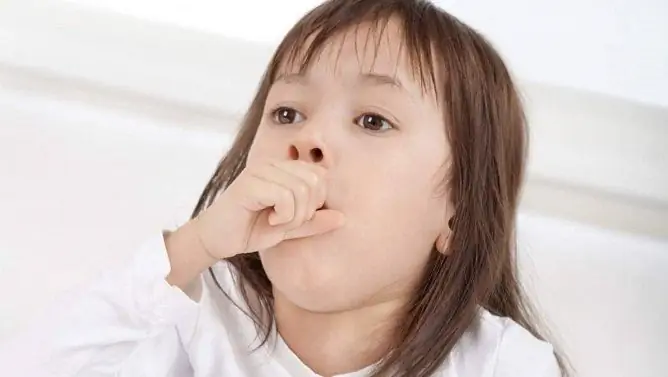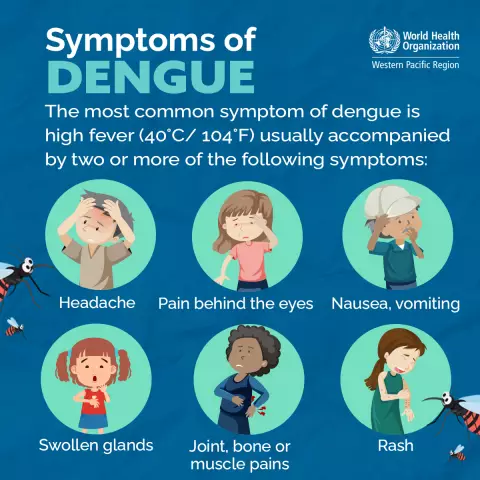- Author Rachel Wainwright wainwright@abchealthonline.com.
- Public 2023-12-15 07:39.
- Last modified 2025-11-02 20:14.
Allergic cough in a child: symptoms, differences from a cold, causes and treatment
The content of the article:
- What is an allergic cough
- Symptoms of allergic cough in children
- Diagnostics
- Complications and prognosis
- How to treat an allergic cough in a child
- Prevention
- Video
Allergic cough in children (allergic respiration) is observed in pediatric practice quite often. What is the reason for its occurrence? How to distinguish an allergic cough from a cold? What are the treatments for the disease? In our article you will find detailed answers to all these questions.
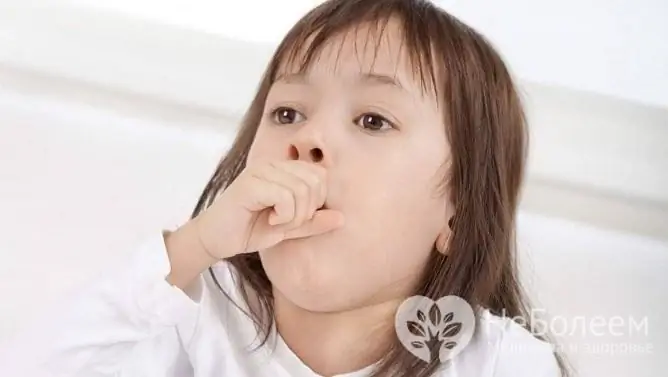
Allergic cough is persistent and may appear at night.
What is an allergic cough
It must be understood that allergic cough is not an independent disease, but is regarded by doctors as a symptom of allergic tracheitis or allergic bronchitis.
The cause of these diseases is contact with various household (plant pollen, animal hair, house dust) or bacterial allergens, that is, substances to which there is an increased sensitivity (sensitization) of the baby's body. The most common allergen is Staphylococcus aureus. This microbe is sown from the secretions of the respiratory tract in many children with allergic respiratory infections.
Immune conflict (allergen-antibody reaction) develops in the mucous membranes of the trachea and bronchi of large and medium diameter. This is the main difference between allergic forms of bronchitis and bronchial asthma, in which the pathological process is predominantly localized in the small bronchi and bronchioles. This is what explains the fact that with allergic bronchitis, the child does not have attacks of suffocation due to bronchospasm.
Symptoms of allergic cough in children
Allergic cough can occur in children of any age. It is persistent, usually dry, but in the future it may be accompanied by coughing up mucous sputum. Often occurs in the form of attacks at night. A cough attack is accompanied by a soreness in the chest, facial flushing, and in some cases vomiting.
The disease is recurrent. Exacerbations can occur several times a year and last 10-15 days, and sometimes longer. In many cases, during an exacerbation in a child, cough is combined with rhinitis (nasal congestion, runny nose with mucous discharge).
Diagnostics
Treatments for allergic coughs and colds are different. Therefore, before prescribing treatment, the doctor conducts a thorough examination of the child, the results of which make it possible to recognize various forms of cough.
With an allergic cough in the lungs of children, dry wheezing and moist medium and large bubbling rales are heard. They are most pronounced on inspiration. This is another distinguishing feature that differentiates allergic bronchitis from bronchial asthma.
When percussion of the chest over the lungs, a boxed tone of sound is noted, which remains at the beginning of the remission period.
Chest X-ray clearly shows:
- increased vascular pattern;
- perivascular infiltration;
- increased transparency of the lungs.
In the general analysis of blood in children with allergic cough, eosinophilia appears, which is moderate or severe.
The child must be referred for consultation with an allergist. The doctor conducts a series of tests to identify the allergen that causes coughing fits.
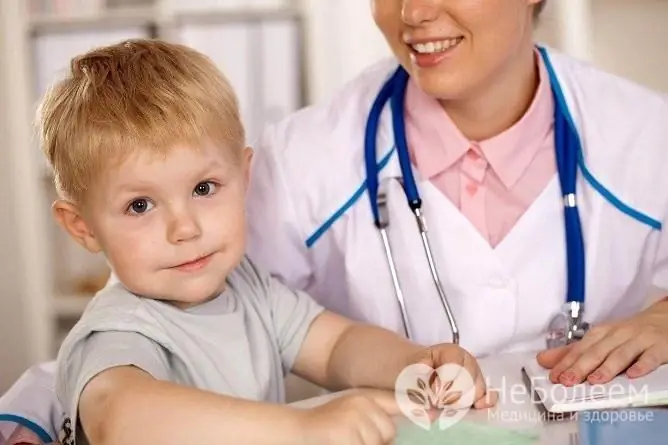
The examination helps to identify the allergen that causes the cough
Complications and prognosis
Allergic bronchitis, despite a prolonged recurrent course, does not cause changes in the internal organs:
- digestive system;
- kidney;
- liver;
- of cardio-vascular system.
But the disease can affect the autonomic division of the central nervous system. Clinically, this is manifested by the following symptoms:
- excessive sweating;
- irritability;
- fast fatiguability;
- capriciousness;
- impairment of memory and learning ability.
Allergic cough is far from a harmless pathology. According to medical statistics, in 30% of children, over time, the disease is transformed into bronchial asthma. 35% of patients are cured (sometimes spontaneously), the rest of the allergic cough attacks persist throughout their lives.
How to treat an allergic cough in a child
Treatment of allergic cough in children should be systematic, long-term and complex. It should combine specific and non-specific measures.
It is imperative that hyposensitization therapy is performed using an allergen, to which the patient has been identified as hypersensitive by setting an allergy test. The duration of the course must be at least two years. If it was not possible to identify the allergen, then hyposensitisation therapy is carried out using histoglobulin. With staphylococcal allergy, the introduction of microdoses of staphylococcal toxoid is indicated.
As practice shows, long-term hyposensitisation therapy significantly reduces the risk of the transition of an allergic cough into bronchial asthma.
Of no small importance in the complex treatment of allergic cough is also given to non-specific therapy, which includes the use of the following groups of drugs:
- immunomodulators (Sodium nucleinate, Pentoxil, Metacil);
- antihistamines (Tavegil, Diazolin, Pipolfen, Suprastin, Ketotifen, Zodak).
In pediatric practice, preference is given to dosage forms designed specifically for children (syrups, drops, suspensions). They provide accurate dosage of the active ingredient of the drug, and in addition, they have a pleasant taste and aroma, so that children take them with pleasure.
Very effective for allergic coughs and inhalation with alkaline or sodium chloride mineral waters. They are carried out as directed by the attending physician using a nebulizer. For inhalation, 1-3 ml (depending on the child's age) mineral water at room temperature without gas is poured into the device container. The procedure must be carried out under the supervision of an adult. Such inhalations contribute to:
- restoration of ionic balance;
- thinning mucus;
- restoration of metabolic processes in the mucous membranes of the airways.
Physiotherapeutic techniques also play a role in treatment, in particular:
- electrophoresis with sodium bromide solution - improves sleep, helps to normalize the balance of inhibition and excitation of the central nervous system;
- ultraviolet irradiation (UFO) - increases the protective functions of the body, enhances the production of antibodies, stimulates non-specific immunity.
Of great importance in the complex therapy of allergic cough is given to general healing procedures:
- dousing your feet with cold water;
- air and sun baths;
- active outdoor games;
- physical therapy classes;
- general massage.
When carrying out hardening procedures, it is important to observe a gradual decrease in temperature and an increase in the duration of exposure. Children of senior preschool and school age in the absence of relapses of allergic cough for more than 3-4 months are recommended to practice therapeutic swimming.
Prevention
Prevention of respiratory allergies should begin from the first days of the child. It includes the following activities:
- organization of proper feeding (breastfeeding, gradual introduction of complementary foods in accordance with age, restriction of foods with pronounced allergic properties;
- organization of proper childcare (regular walks in the fresh air, sports, hygiene measures);
- limiting contact with household allergens [regular wet cleaning, airing the room, refusing to use various aerosols in the child's room (deodorants, hair sprays, eau de toilette), excluding secondhand smoke];
- timely and complete treatment of respiratory infections, sanitation of foci of chronic infection (caries, chronic tonsillitis).
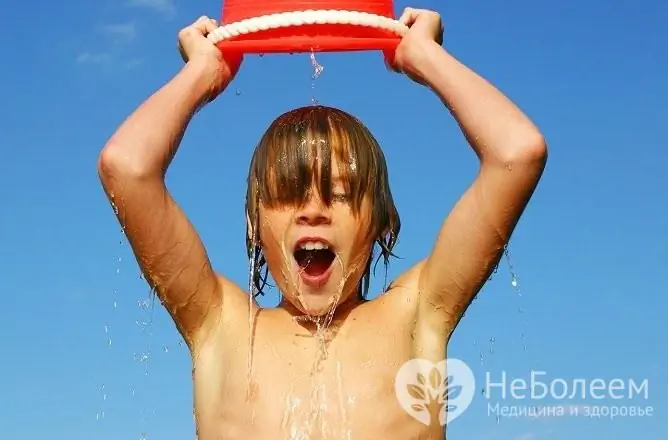
Hardening is an effective method of preventing allergic cough
Secondary prevention of allergic respiratory infections is aimed at preventing the exacerbation of the disease. Children should be under constant dispensary supervision by a pediatrician, allergist-immunologist and pulmonologist. They are allowed physical education, but their participation in competitions is not allowed, since significant physical and emotional stress can provoke a strong attack of allergic cough.
With frequent exacerbations, a medical withdrawal from preventive vaccinations is made. Vaccination can be carried out only against the background of prolonged (at least 1-2 years) remission of allergic bronchitis.
Video
We offer for viewing a video on the topic of the article.
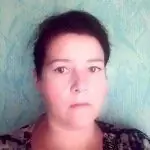
Elena Minkina Doctor anesthesiologist-resuscitator About the author
Education: graduated from the Tashkent State Medical Institute, specializing in general medicine in 1991. Repeatedly passed refresher courses.
Work experience: anesthesiologist-resuscitator of the city maternity complex, resuscitator of the hemodialysis department.
Found a mistake in the text? Select it and press Ctrl + Enter.

